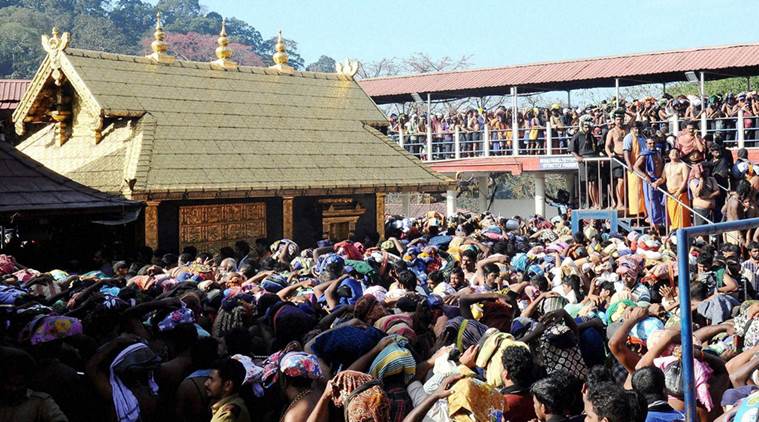 The court reserved its judgment on a petition challenging restrictions on the entry of women inside the temple dedicated to Lord Ayyappa.
The court reserved its judgment on a petition challenging restrictions on the entry of women inside the temple dedicated to Lord Ayyappa.
The Sabarimala shrine in Kerala is not a denominational temple and hence does not enjoy rights under Article 26 of the Constitution to manage its own religious affairs, the state’s Left Front government told the Supreme Court Wednesday. The court reserved its judgment on a petition challenging restrictions on the entry of women inside the temple dedicated to Lord Ayyappa.
Senior Advocate Jaideep Gupta told a five-judge Constitution bench headed by Chief Justice of India Dipak Misra that the Constitution empowered the state to make laws not only for social welfare but also for religious matters. The Bench also comprised Justices A M Khanwilkar, R F Nariman, D Y Chandrachud and Indu Malhotra.
The temple management and others defending the restrictions — barring entry to women “of menstruating age” — had contended that Ayyappa devotees formed a denomination by themselves and were entitled to frame rules for the shrine without the state’s interference.
Opposing this, Gupta contended that the High Court had held the temple to be denominational but had not applied all the detailed tests laid down by the Supreme Court before deciding so. A denomination should have a definite structure, name, etc., while Sabarimala devotees had no such identifiable features, he argued.
Senior Advocate K Ramamurthy, one of the two amicus curiae in the case along with Senior Advocate Raju Ramachandran, contended that the state can interfere only in the secular affairs of the temple and not its religious aspects. “Temples in South India were taken over by state governments for political reasons as they bring money to the state. But the state can only interfere with secular affairs related to management,” he said.
Representing the petitioners, Senior Advocate Indira Jaising said the rules amounted to discrimination on grounds of sex as only women between the age of 10 and 50 are restricted. “If it’s only applicable to women, then it is based on sex,” she contended.
Jaising said the language of Article 15, which employs the term “only”, was an impediment in interpreting personal laws. The provision says: “The State shall not discriminate against any citizen on grounds only of religion, race, caste, sex, place of birth or any of them”. This means there can be discrimination on grounds of gender plus something else, she said.
On the argument that the object of the tradition was not discrimination, she said it was the impact that mattered and not the intent. Justice Chandrachud said: “Suppose there is discrimination on the ground of sex plus, if the impact of that discrimination is to affect your rights, then it doesn’t matter if it’s sex plus.”
Jaising argued that the “impact is disproportionate and is felt only by one sex because men don’t menstruate”. “Any custom which violates Articles 14 and 15 is not worthy of recognition by the court,” she said. Justice Nariman, however, pointed out that “it is for the court ultimately to decide what’s essential (practice) and what’s not”.
Jaisingh contended that the tradition was to stigmatise women and amounted to the worst kind of stereotyping.
She also opposed the contention that the deity was a living juristic person with fundamental rights. On this, the CJI pointed out that the deity is a “perpetual minor” and had some rights including the right to privacy with regard to certain rites observed in the temple, but whether that privacy is in the same sense as reflected in the Puttuswamy judgment, which recognised privacy as a fundamental right, will have to be examined.
The controversy relates to the tradition of the temple where women between the age of 10 and 50 are not allowed. Those defending the tradition say it is rooted in the belief that the deity is an “eternal celibate” and that women will not be able to complete the rigorous 41-day preparatory penance.
The petitioners, a group of five women lawyers, have challenged Rule 3(b) of the Kerala Hindu Places of Public Worship (Authorization of Entry) Rules, 1965, which authorises the restriction. The Kerala High Court had in the past upheld the restrictions and held that only the “tantri (priest)” was empowered to decide on traditions.
 Kerala women have united in their fight to obey the religious traditions and are ready to wait to enter Sabarimala. (Source: Twitter)
Kerala women have united in their fight to obey the religious traditions and are ready to wait to enter Sabarimala. (Source: Twitter)
In U-turn, petitioner says ready to wait till 50
New Delhi: In a twist to the Sabarimala temple case on Wednesday, one of the five women lawyers, who had filed the petition challenging age restrictions on the entry of women to the shrine in Kerala, said she believed in the customs of the temple and was willing to wait till she was 50 to visit the shrine.
Advocate Prerna Kumari said “I have a change of mind when I see there is a ReadyToWait (campaign) and lot of women who are south Indian are not willing to go to the temple. They are saying they are ready to wait till 50 years…”
She was referring to the ‘ReadyToWait’ campaign on social media by women devotees of Sabarimala announcing their willingness to wait till they turned 50 years. Temple traditions forbid the entry of women between 10 and 50 years of age as the deity is an eternal celibate. “…if the ladies are ready to wait, I am with them,” she said.